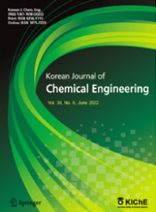Overall
- Language
- English
- Conflict of Interest
- In relation to this article, we declare that there is no conflict of interest.
- Publication history
-
Received March 31, 2023
Accepted December 5, 2023
-
 This is an Open-Access article distributed under the terms of the Creative Commons Attribution Non-Commercial License (http://creativecommons.org/licenses/bync/3.0) which permits
unrestricted non-commercial use, distribution, and reproduction in any medium, provided the original work is properly cited.
This is an Open-Access article distributed under the terms of the Creative Commons Attribution Non-Commercial License (http://creativecommons.org/licenses/bync/3.0) which permits
unrestricted non-commercial use, distribution, and reproduction in any medium, provided the original work is properly cited.
Most Cited
The Removal of Benzene and Toluene in Natural Gas with Cryogenic Liquid Propane: Eff ects and a Cyclic Purifi cation Process
Abstract
Liquefi ed natural gas production plants usually suff er from line blockage, which causes economic, environmental, and
safety issues. The blockage, mainly caused by the solidifi cation of heavy hydrocarbons, should be avoided or mitigated by
removing the impurities as thoroughly as possible. In this work, we proposed a scheme taking cryogenic liquefi ed propane
as absorbent to absorb heavy hydrocarbons in the liquefi ed natural gas production process. This paper fi rst investigated
freeze-out profi les of liquefi ed natural gas combined with marginal benzene and toluene by the ThermoFAST simulator,
which showed that the precipitated solid tended to form under a low temperature, which posed challenges in purifi cation.
Subsequently, the feasibility of using liquefi ed propane as an absorbent to remove benzene and toluene was studied using
Aspen Plus. A cryogenic absorption and regeneration process for liquefi ed natural gas purifi cation was proposed, and factors
infl uencing the performance were investigated. The results showed that the hydrocarbon impurities are removed more
thoroughly at a high fl owrate of the recycled absorbent stream. The absorption process exhibited an apparent cooling eff ect
mainly caused by the vaporization of liquefi ed propane to the gas phase, and the higher operation temperature impedes the
vaporization process. For a better purifi cation eff ect, the system should be operated under a lower pressure or with a higher
recycled absorption solution fl owrate. Based on the design simulation results, utilizing liquefi ed propane as an absorbent to
remove heavy hydrocarbons is novel and promising for LNG purifi cation.

